TOKYO (Sept. 3) -- When Tsuchiku SHIMOYAMADA (AUS) decided to relocate from his native Japan to Australia, he wasn't showered with gifts from a grateful federation looking for an established wrestler to give the country a global boost.
He was more interested in golden beaches than bringing his new homeland gold medals.
"I was in Cairns, and I was feeling like, 'I want to move to Australia,'" Shimoyamada said during a trip back to Japan in July for a tournament. "I like this place. It's good for me. The lifestyle is easy."
Four years after announcing his retirement and three years after making the bold move to Land Down Under, the 31-year-old is back in the game, hoping to put a country more known for its swimmers and rugby players onto the world wrestling map.
While a longshot at best, Shimoyamada, a two-time Japan national champion and two-time Asian medalist, will get a chance to become Australia's first-ever world medalist when he takes the mat at Greco 67kg next week in Zagreb.
It will be the third World Championships of his career and first since 2021, when he nearly knocked off the Olympic champion and symbolically left his shoes on the mat after a repechage-round loss as a sign of his retirement. He finished ninth in his only other appearance in 2018.
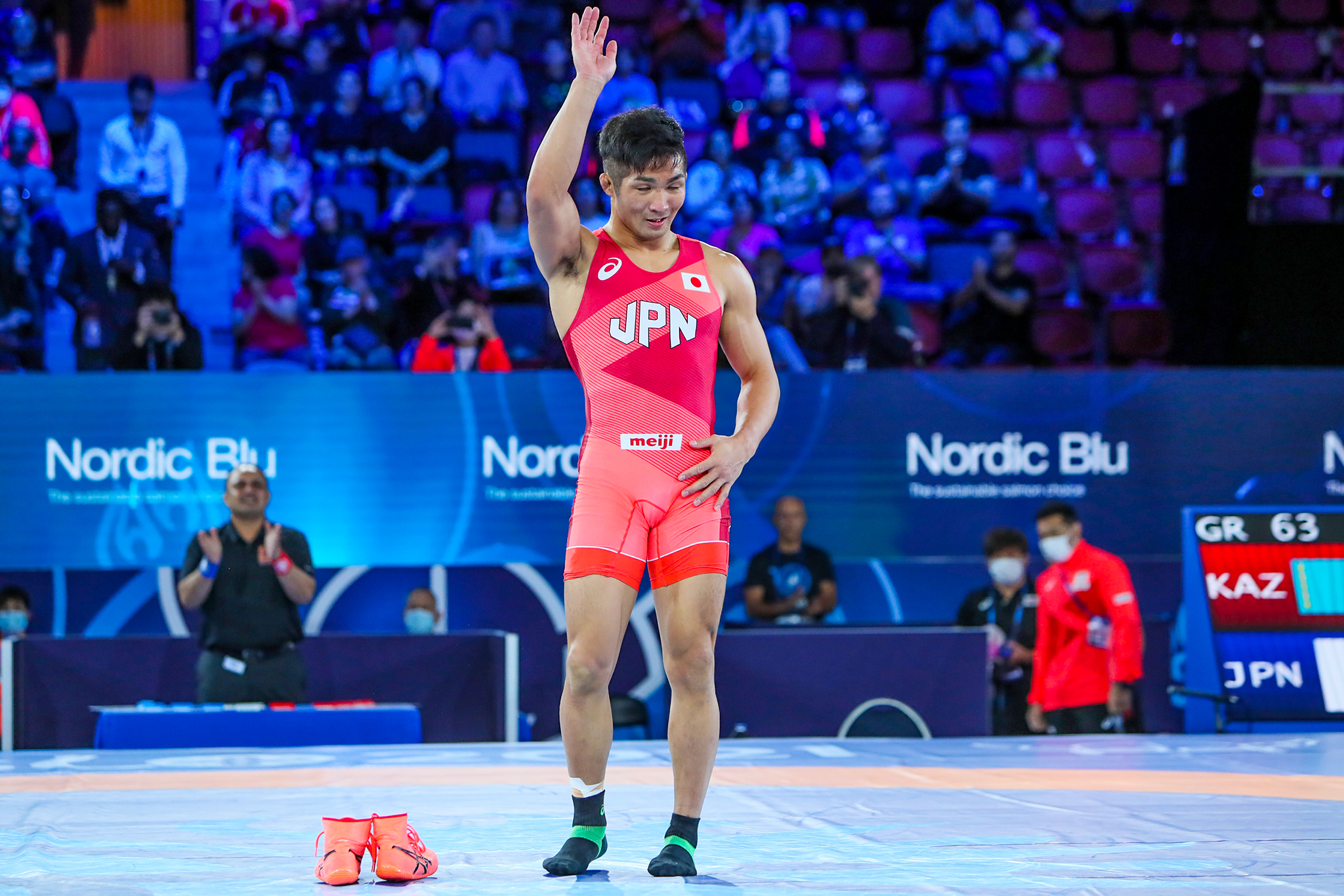 Tsuchika SHIMOYAMADA (AUS) had left his shoes on the mat during the 2021 World Championships to mark his retirement. (Photo: United World Wrestling / Martin Gabor)
Tsuchika SHIMOYAMADA (AUS) had left his shoes on the mat during the 2021 World Championships to mark his retirement. (Photo: United World Wrestling / Martin Gabor)
Success breeds success, and Australian wrestling officials are hoping that Shimoyamada, in addition to helping cultivate a new generation of wrestlers, can produce results that will spark more interest in the sport. Getting through the rounds, even if he falls short of a medal, would have a positive effect, says one official.
"That would be a very good achievement for us," says Aryan Negahdari, president of New South Wales Wrestling Federation, who accompanied him and several wrestlers to Japan. "For many, many years, we haven't a wrestler making it into the semifinals, or even the quarterfinals of the World Championships. Even that itself would be a good achievement."
While Australia has never won a world medal, it may be surprising to learn that the country has actually brought home three Olympic medals -- although it has been nearly eight decades since the most recent one.
Eddie SCARF broke the ice with a bronze medal at freestyle 87kg at the 1932 Los Angeles Olympics. Australia then got two at the 1948 London Games, a silver from Richard GARRARD at freestyle 73kg and a bronze from Joseph ARMSTRONG at freestyle over-87kg. The closest the country has come since then was a fourth place at Freestyle 62kg by Cris BROWN at the 1984 Los Angeles Games.
On the world stage, the highest finishes by Australians were fifth places by Jackie BRYDON at women's 50kg in 1993 at Stavern, Norway, and Macedonian-born Lila RISTEVSKA at women's 47kg at Moscow 1995. There have been three men who have placed sixth, all in freestyle, with the most recent being Uzbekistan-born Talgat ILYASOV at 74kg at New York 2003.
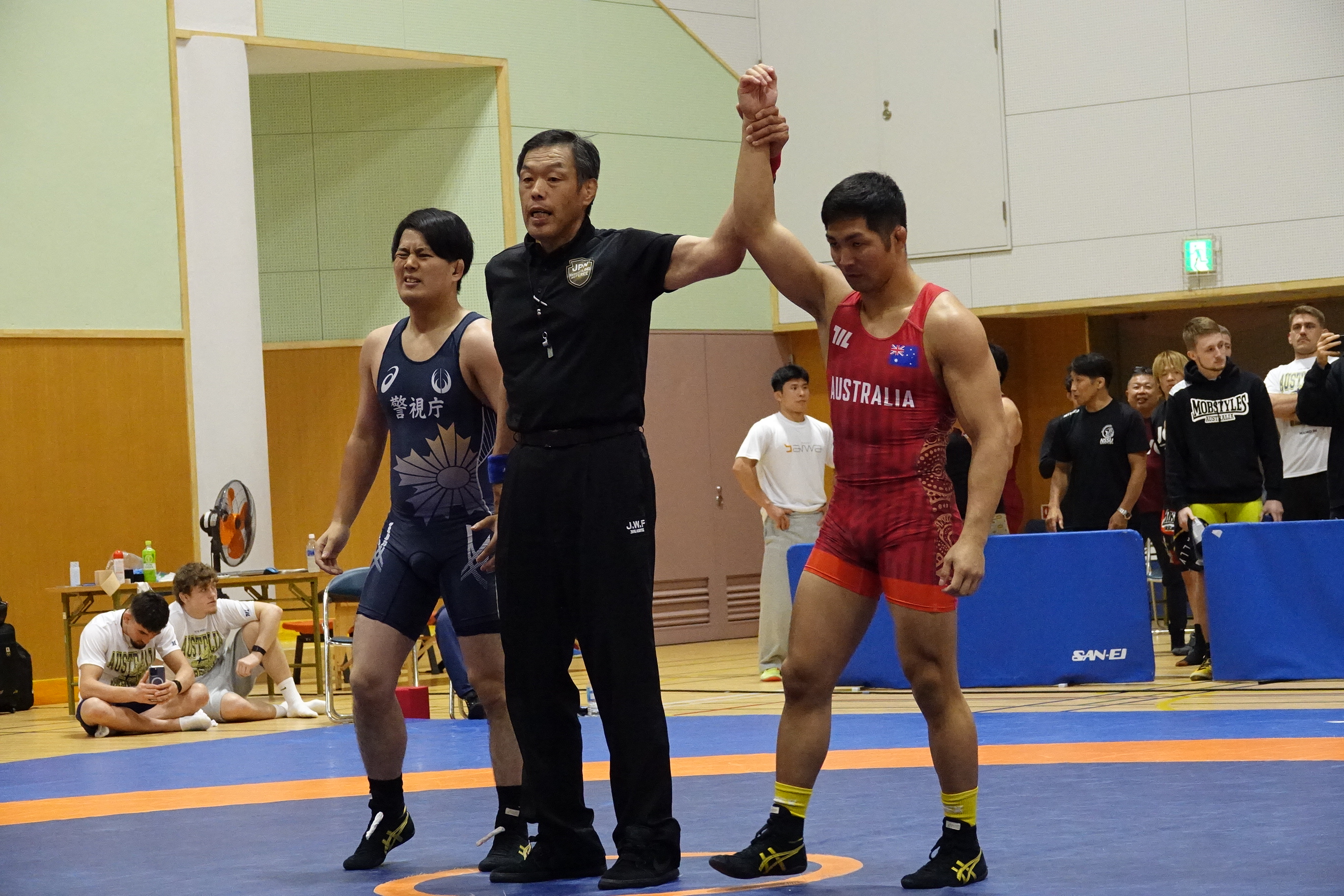 Tsuchika SHIMOYAMADA advances to the semifinals at the All-Japan Non-Student Championships in July with a 52-second win over Kokoro GOTO. (Photo: Koji Fuse / wrestling-spirits.jp)
Tsuchika SHIMOYAMADA advances to the semifinals at the All-Japan Non-Student Championships in July with a 52-second win over Kokoro GOTO. (Photo: Koji Fuse / wrestling-spirits.jp)
As a Greco wrestler, Shimoyamada will be trying to beat even longer odds. Up to now, Australia has never placed higher than 18th at a World Championships.
Following his graduation from Nippon Sports Science University, which also produced Paris Olympic champions Kenichiro FUMITA and Nao KUSAKA as well as Tokyo bronze medalist Shohei YABIKU, Shimoyamada joined the Tokyo Metropolitan Police Department team. He stayed on the force after ending his wrestling career, but found it wasn't for him.
"When I was back in Japan, I started working for the police," he says. "To be honest, it was stressful. It was not for me."
A trip to Australia opened his eyes to a place where he could start a new life. At first, he planned to only go into coaching, but a practical reason arose that led him to decide to return to the mat -- it helped him get the visa he needed to live in the country.
"I didn't think about wrestling by myself, I thought I could help as a coach," he says. "But for the visa condition, it's better to keep active."
In 2023, he received a residence visa as a "global talent," and in January 2024, United World Wrestling approved his switch of national affiliation to Australia.
Unfortunately, the approval did not come in time for him to try to qualify for the 2024 Paris Olympics. He is still working on gaining citizenship. His need to find a way to make a living proved harder than he expected as he settled in Sydney.
"I'm teaching wrestling, and I'm working as a lifeguard at a swimming pool," he said. "Life is not easy. It's expensive, everything, rent, bills, car."
Shimoyamada's need for gainful employment produced a symbiotic relationship with his hosts, who suddenly found themselves blessed with a world-class competitor to help raise the level of the sport.
"I really think we're super lucky to have him because not only is he a high-level athlete, but he has been helping us a lot as a coach, especially Greco-Roman coach," Negahdari says. "So because of him, we have a lot more athletes doing Greco-Roman, training under Tsuchika."
Shimoyamada's arrival also gave Australia a bonus of sorts -- a connection with an established power in the sport. Through Shimoyamada's ties with his alma mater NSSU, there have been numerous exchanges of wrestlers between the two countries.
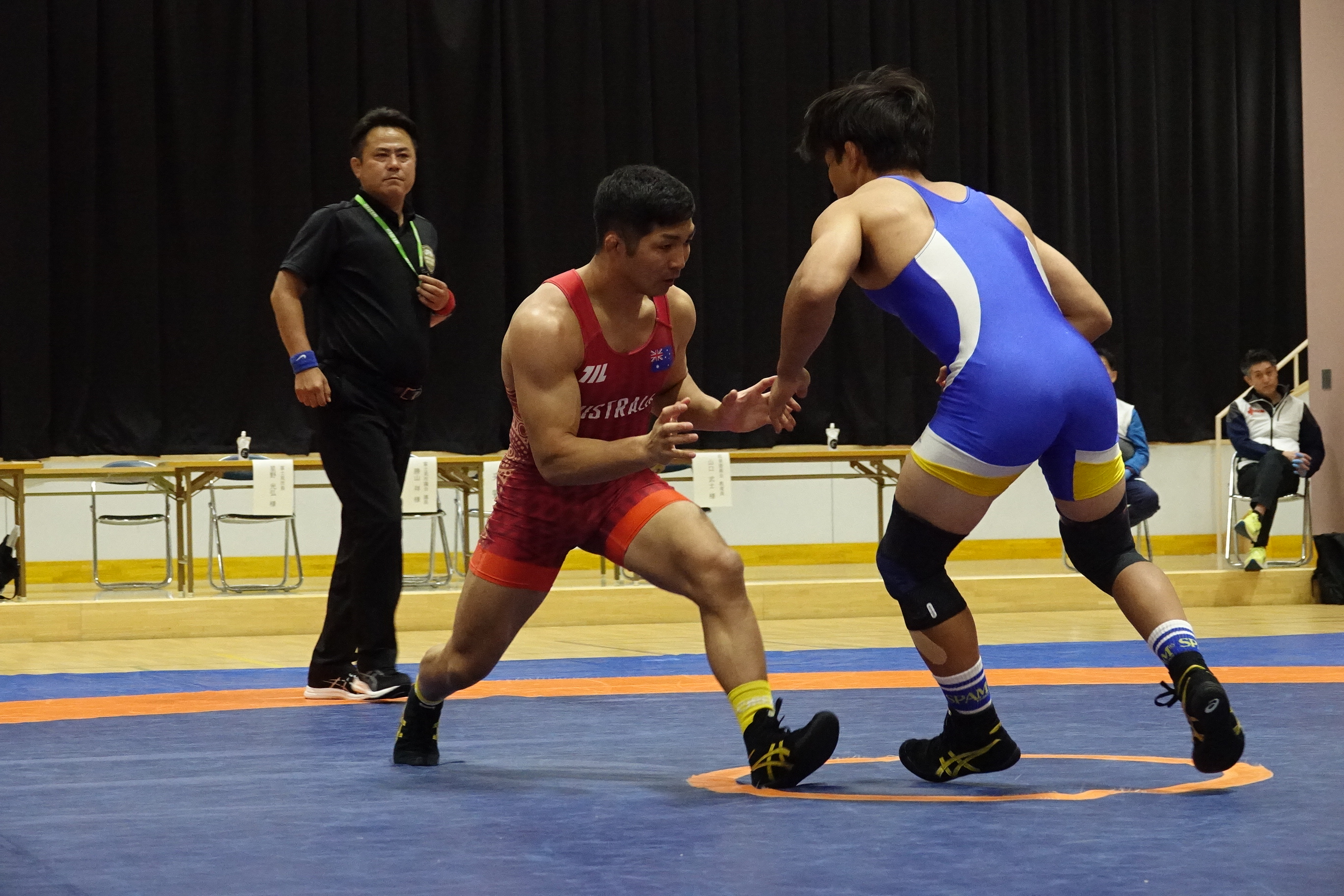 Tsuchika SHIMOYAMA faces Keitaro ONO in his opening match at the All-Japan Non-Student Championships in July. (Photo: Koji Fuse / wrestling-spirits.jp)
Tsuchika SHIMOYAMA faces Keitaro ONO in his opening match at the All-Japan Non-Student Championships in July. (Photo: Koji Fuse / wrestling-spirits.jp)
In the early summer, Paris Olympic silver medalist Daichi TAKATANI and former women's U23 world champion Yu SAKAMOTO went to Australia to put on clinic. In July, Shimoyamada led a contingent of Australian wrestlers who participated in the All-Japan Non-Student Championships (a second-tier national tournament) before training at NSSU.
"He's also been very good for us to build connections with Japan," Nagahdari says. "We've been coming [to Japan] for four years now, like twice a year, training with the Japanese teams. We've had a lot of Japanese athletes coming over to Australia to do seminars for us, to do training with us...It has been very, very beneficial for us in many different ways."
Shimoyamada entered the Non-Student meet at 72kg to give him the high-level competition he needed as preparation for the World Championships, and which is sorely lacking back in Australia. Aside from the low-level Oceania Championships and tournaments in Australia, it was his first outing since the 2021 World Championships.
He held his own, although he lost in the semifinals to Yamato HAGIWARA before winning his bronze-medal match over Rintaro SOGABE, the younger brother of Paris Olympian Kyotaro SOGABE, a fellow NSSU alum who will be Japan's entry at 67kg and a potential opponent of Shimoyamada in Zagreb.
Shimoyamada made his international debut at the 2016 Asian Championships in Bangkok, placing eighth. He won his first All-Japan title in December 2017, earning a return to the continental meet in 2018 in Bishkek, where he took home the silver medal after losing in the final to Almat KEBISPAYEV (KAZ).
Just when it looked like he had lost his edge after losing back-to-back All-Japan finals to Shogo TAKAHASHI in 2018 and 2019, Shimoyamada rebounded to claim his second title in 2020 with a victory over rising NSSU star Katsuaki ENDO. After Shimoyamada left the scene, Endo and Kyotaro Sogabe would battle ruthlessly for supremacy at 67kg.
His final year wrestling for Japan may have been his most productive. At the 2021 Asian Championships in Almaty, he avenged his loss to Kebispayev from three years before to capture the elusive gold. He followed that with a victory at the All-Japan Invitational Championships, known as the Meiji Cup, to clinch his ticket to the World Championships in Oslo.
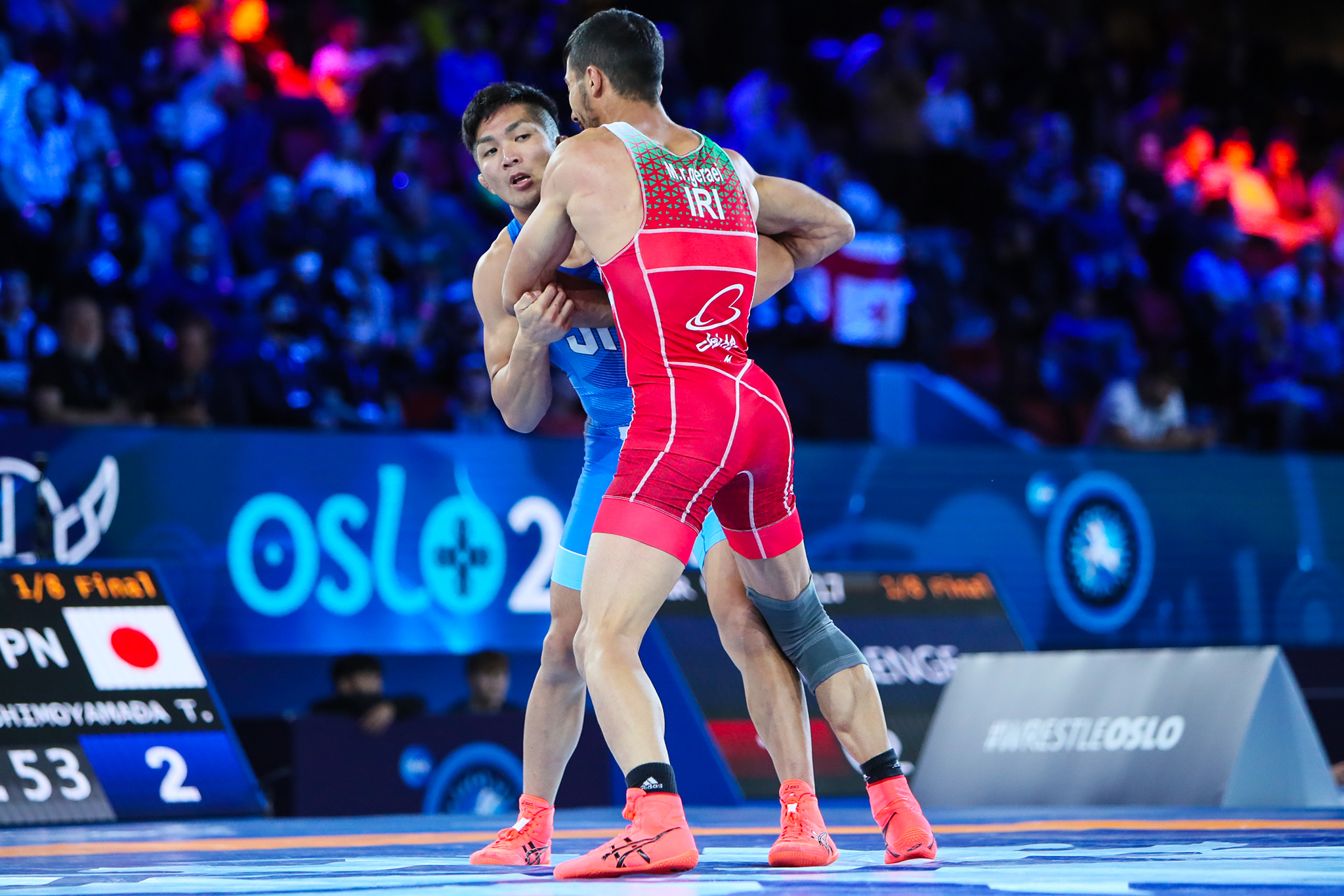 Tsuchika SHIMOYAMADA (AUS) was dominating Mohammadreza GERAEI (IRI) in their match at the 2021 World Championships before being pinned. (Photo: United World Wrestling / Martin Gabor)
Tsuchika SHIMOYAMADA (AUS) was dominating Mohammadreza GERAEI (IRI) in their match at the 2021 World Championships before being pinned. (Photo: United World Wrestling / Martin Gabor)
In the second round, Shimoyamada encountered Mohammadreza GERAEI (IRI), one of the few gold medalists from the Tokyo Olympics two months earlier who were entered at the worlds. It would probably be the most impressive loss of his career.
Shimoyamada was dominating the Iranian, scoring with a 4-point arm throw to build up a 6-1 lead. But disaster struck with just over a minute to go. Geraei caught Shimoyamada in a lapse and bear-hugged him backward directly to his back for a shocking victory by fall.
Shimoyamada then lost his repechage match to teenager Hasrat JAFAROV (AZE), and the last we saw of him was him walking off the mat, leaving his shoes behind.
Fast forward four years, and Shimoyamada is now competing for himself and his adopted homeland. While he would like to qualify for the 2028 Los Angeles Olympics, age and opportunity might be too big hurdles to get over.
"I think that's a last challenge, for the Olympics, because I'm not young," Shimoyamada said. "If I can make it for Australia, that's good. Everyone will get interested in wrestling. That's what I should do."
Looking long range, Australian officials are hoping to develop talent to make a good showing when the country hosts the Olympics in Brisbane in 2032. They are hoping that Shimoyamada can spark enough interest and help raise the level in time.
"I think we're in the very early stages, compared to international standards," Nagahdari says. "But I think we can definitely see a very huge improvement, like in the last few years. We have a lot more members now, the number of our wrestlers. For example, compared to only three or four years ago, it has doubled. It's growing slowly, but at a good pace.
"It's a very slow progress, because you know that wrestling is super hard. It takes like a decade to build an athlete to that level. And we're really focusing our efforts toward the Brisbane Olympics in 2032."
Shimoyamada is determined to do whatever he can to make it happen.
"It's hard to get a gold medal at the World Championships and the Olympics, to be honest," he says. "If I make the Olympics, the next generation can become interested in getting to the Olympics or World Championships and they will practice hard."


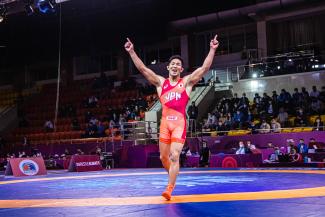
 Tsuchika SHIMOYAMADA (AUS) had left his shoes on the mat during the 2021 World Championships to mark his retirement. (Photo: United World Wrestling / Martin Gabor)
Tsuchika SHIMOYAMADA (AUS) had left his shoes on the mat during the 2021 World Championships to mark his retirement. (Photo: United World Wrestling / Martin Gabor) Tsuchika SHIMOYAMADA advances to the semifinals at the All-Japan Non-Student Championships in July with a 52-second win over Kokoro GOTO. (Photo: Koji Fuse / wrestling-spirits.jp)
Tsuchika SHIMOYAMADA advances to the semifinals at the All-Japan Non-Student Championships in July with a 52-second win over Kokoro GOTO. (Photo: Koji Fuse / wrestling-spirits.jp) Tsuchika SHIMOYAMA faces Keitaro ONO in his opening match at the All-Japan Non-Student Championships in July. (Photo: Koji Fuse / wrestling-spirits.jp)
Tsuchika SHIMOYAMA faces Keitaro ONO in his opening match at the All-Japan Non-Student Championships in July. (Photo: Koji Fuse / wrestling-spirits.jp) Tsuchika SHIMOYAMADA (AUS) was dominating Mohammadreza GERAEI (IRI) in their match at the 2021 World Championships before being pinned. (Photo: United World Wrestling / Martin Gabor)
Tsuchika SHIMOYAMADA (AUS) was dominating Mohammadreza GERAEI (IRI) in their match at the 2021 World Championships before being pinned. (Photo: United World Wrestling / Martin Gabor)
Share your thoughts.
Comments